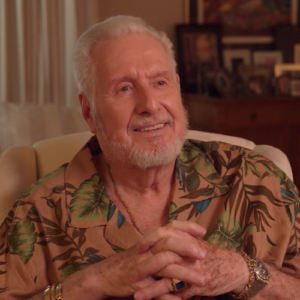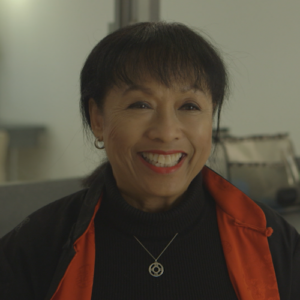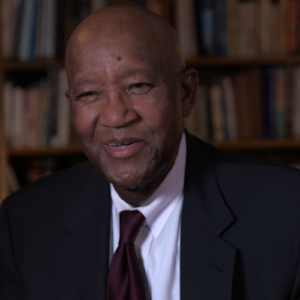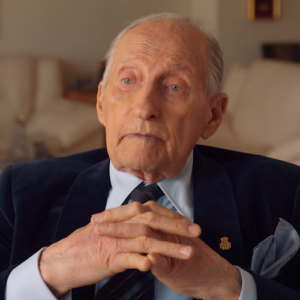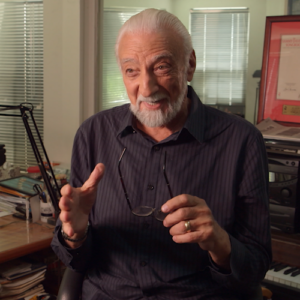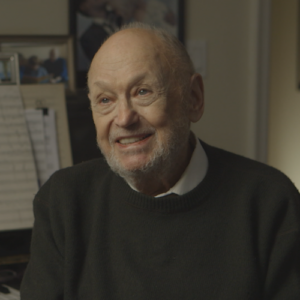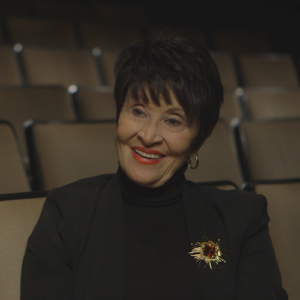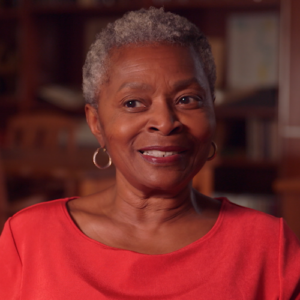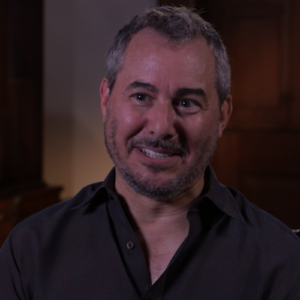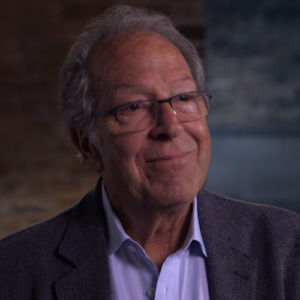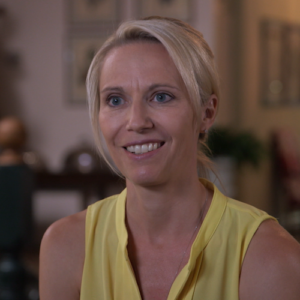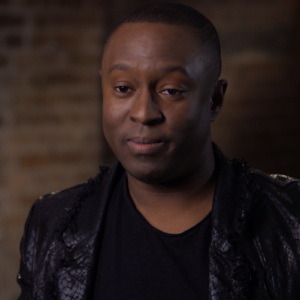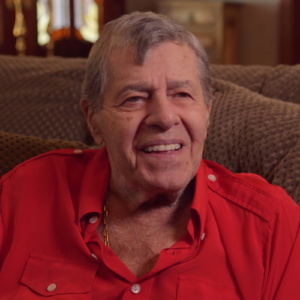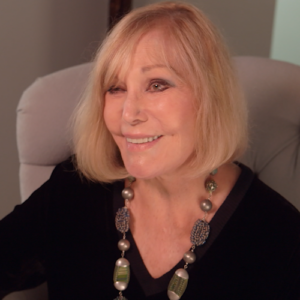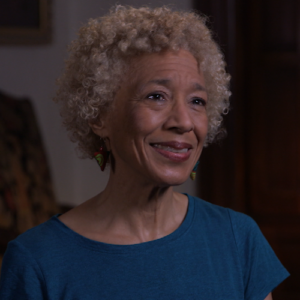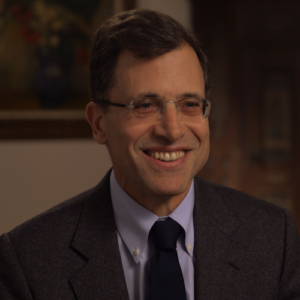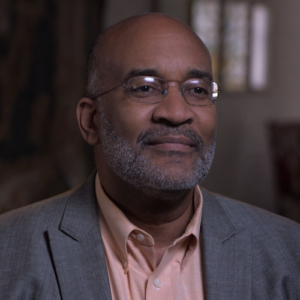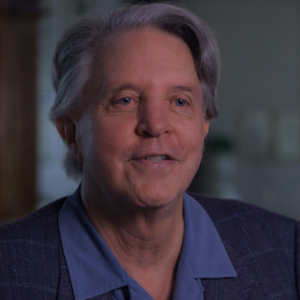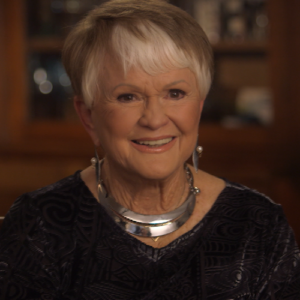Norman Lear: Introduce yourself, real quick, just tell us where we are?
Interviewer: I’m Norman Lear, and I’m on Motor Avenue in Los Angeles.
Norman Lear: Who is Sammy Davis Jr?
Interviewer: Sammy Davis Jr. Might have been. The most talented man in the world, as talented as anyone in the history of show business.
Norman Lear: How did Sammy into your life. And you, his.
Interviewer: Heart of Sammy, enter my life? When I. When Ed Simmons and I wrote for Martin and Lewis, Jerry Lewis had a playing house behind his house on Amalfi in Pacific Palisades is named after his sons Gary and Ron the and Playhouse and Tony Curtis and Janet Lee, Sammy Davis Jr. Jerry, Danny Arnold. We were all very close. We spent a lot of time there. We made some films here. And I always wondered, whatever happened to these little films we we made there?
Norman Lear: Let’s skip ahead to all the families. Sure. Your time is tight. A year after its premieres, it’s the country’s most talked about show. What was the show’s original intent? What were you planning to build?
Interviewer: Well, I had read about a show that was done in Britain called Til Death US through part by Johnny Speight and and was about a father and son who argued about everything politically. And I grew up with that father who used to call me the laziest white kid he ever met. And I’d tell him he’s putting down a whole race of people just to call me lazy. And that’s not what I’m doing. You’re the dumbest white kid. And so when I read that, I thought, How did I never think of this? And at that time, I wanted to do a situation comedy. And so that’s how where that idea came from.
Norman Lear: Was Sammy a fan of the show?
Interviewer: Sammy was a great fan of the show. And Sammy, you know, he he was on me for about one year. Was did we do that show the second year? I think.
Norman Lear: Too.
Interviewer: In 72, we went on in 71. So it was the second season and he hounded me. He just had to do the show. He loved the show. And I said, And we don’t do guest stars. There are no guest stars. And then he might have suggested it, or I did, but we gave him we worked at this for weeks in advance in order to get Sammy on that show. Archie needed a second job with some income he required. So he started to drop drive a cab at night, and for several shows, he drove a cab at night. So we were all set for him to have had a passenger in the backseat who left a briefcase there when he left the cab. And that was Sammy Davis Jr. So Sammy came to the house to pick up his briefcase, and that’s how he happened on the show.
Norman Lear: What was Sammy like on set?
Interviewer: Sammy on set. Offset was nobody loved like Sammy. He loved everybody and he loved every moment. And he was life incarnate.
Norman Lear: Like you said, he was the first guest to play himself.
Interviewer: Was the first guest. And the only there were no was ever another guest.
Norman Lear: Were you nervous about that or did you think he would be as comedic as he was?
Interviewer: No. Once we had a good idea for a good reason why he would be in the show, I was comfortable with it.
Norman Lear: The genius of it is Archie never used the N word on your show.
Interviewer: Yes, he did. He did.
Norman Lear: He did. Okay.
Interviewer: Archie did use the N word on the show.
Norman Lear: How did you get Sammy to use it?
Interviewer: It came naturally to Sammy. You know, I should tell you that a lot of what occurred was a result of Sammy. I mean, and I can’t. I couldn’t know sitting here. Exactly. I just remember that he contributed as a writer.
Norman Lear: Or.
Interviewer: Coming out of the character and the visit. He was as much a writer as he was a performer. And the kiss was his idea.
Norman Lear: Wow. Okay. I didn’t know that. What was Archie’s reaction to the kiss?
Interviewer: Archie’s reaction to the kiss you and I had written 20 million people have seen. There’s no way I can improve on it.
Norman Lear: Okay. Well, in 2012, The New York Times wrote an article commemorating the 40th anniversary of that kiss. Why do you think that kiss is still such an iconic moment in television history?
Interviewer: Well, to the extent that that kiss is an iconic television moment, a black man was putting his lips on a white cheek. Now, as silly as that sounds, that should be a national incident. It was that because nobody had ever seen that before. But but looking back on it now, it’s easy to see how much more comfortable with the relationship of the two races such action is. That was.
Norman Lear: Let’s go back a bit. What was television like in the early fifties?
Interviewer: Television in the early fifties. When you say, well, what’s it like? It was it was in its infancy and in its infancy, there was a lot of need to introduce the people in its executives projecting as they thought they were doing the the American audience. So there was a little bit that’s going on today, too. I’m I’m asked all the time if I thought all the family could be on the air today as it was at the time. And when I don’t have the answer because I’m not current in television, but I ask all my friends who are the, you know, showrunners of all the shows, and they say, no, they they won’t let you deal with these for those subjects. And so I see lots of family shows that just don’t go there. They’re they’re doing well and dealing in other problems, but they just don’t go there.
Norman Lear: Tell us a bit about the Colgate Comedy Hour. What kind of show was it.
Interviewer: Colgate Comedy Hour was? I mean, I think it could have been the second variety show on television. The first one was my first job in national television, was a Jack Haley Ford Star review. And Simmons and I were hired to do that. First, we had written for anybody but Danny Thomas one item, which he did at a at Ciro’s in Los Angeles, and an agent asked who wrote that? And two days later, we were in New York writing the Jack Haley Ford Star Review. It was M.K. was its agent. And Jerry Lewis saw one sketch on that show, wanted those writers who were connected to We were represented by AMC anyway. It was easy for them to make the switch. Took us away from Jack Haley and gave us to Martin Lewis. So we began the Colgate Comedy Hour. We were its first writers for three years. Well, let me tell you, Sammy Davis started Jerry Lewis at the Garrison Playhouse, had a birthday party, and Simmons and I were going to the birthday party and we couldn’t think of a gift. We wanted to make it funny. And we had a stuck window in our office in a little apartment on North Flores. And. And they send somebody to fix the window. And the guy looked like he was my age. Now, it was probably 70, but he was short, he was small. He was being looked like Popeye. That’s I always So I wrote about him in my book as a Popeye character. And then we had him. We took him down to a package maker and we put him with his knees crossed, sitting down. It looked like the box that he filled in and looked like it could be a television set. There were big then the floor, not the floor model, but the table model, television set. And they fixed the box with a ribbon that when you put the top on, the ribbon followed it. It just looked like a, you know, a television set, a gift. We had him out of the box in a car with the motor on because it was in a cool month. And and when and all the gifts were on a big coffee table and Patty, his wife and Jerry were behind the table. Sammy was one of the guests, which is why I’m telling the story. And when it came time we ran up, we put we got him. And I said, I if he got in, if you don’t laugh, there’s an extra $20 in and whatever. And so we put the top on it, we carried it, and Danny Arnold yelled out, Hey, they’re going to buy a television set anyway. We put it on the near empty now coffee table, and Patty opened the box. He had cellophane, by the way, wrapped around to here and a ribbon and and the cards said this is something you don’t have. Perhaps the only thing you don’t have your very own human being. So Patty takes the box off. The darling guy in order not to laugh.
Norman Lear: Is.
Interviewer: Closed his eyes, but is looked like this Marvin leaving called Nerve was Jerry’s doctor. He was the only doctor in the room, was standing on a chair on the outside of this to look over the others. And from where he was, the only doctor in the room said they’ve given him a not a corpse. A what’s the other word for corpse? Not a corpse. They’re giving him a cadaver. Thank you. So maybe leave me standing on the outskirts of the crowd on a on a chair. The only doctor in the room, the other side giving him a cadaver. And Patti screams and the place goes crazy. And and I remember the one person who didn’t. And a lot of people were angry at us. Sammy was not. And the little I got yelled into the box, You can stop by your laptop. It’s okay. Okay. Open your eyes, everybody. You know, I had to have a drink with him and take a picture with him and so forth. And Simmons and I left earlier, and it was Sammy who drove him home.
Norman Lear: Similar to the Kiss on the Colgate Comedy Hour, Eddie Cantor mobbed Sammy Davis Jr. Junior’s brow. The network in L.A. received hate mail. Sponsors threatened to pull out for fear of Southern backlash. How did Eddie respond to all this?
Interviewer: Well, I got my share of the same thing on the Martha ratio. We did a little girl, black kid won the 60 $400 question, which was a big show on radio, and she got a lot of press. We were doing the Martha Raye Show. We had guest stars. Our guest star was to the Bankhead. And this little girl was so hot in the news we brought her in to in also. And the story was this little girl’s good fairy was Martha, and her bad fairy was Tula Bankhead. And she was. Richmond, Jun Richmond. I koutou. I remember her name, but the name is Judgment. And at the end of the show live, this was up at eight, off at nine live in Bowers when they they were running the credits and they were taking vows. They called out to in Richmond, to Lula, and they picked her up and they had her in their arms and they each kissed her and the audience went wild. And Revlon was the sponsor and and Mr. Close to Revlon, who ran the company, was terribly upset with the 40. I don’t know how many letters they got. But, you know, I learned through the years that 30 letters could drive them crazy. So they got letters and people that hated it and so forth. And the show was canceled.
Norman Lear: You had another show. Sanford and son. Yeah. Woodfox describes Sammy as a white guy in black skin. Is that a fair description?
Interviewer: Red Fox describes Sammy as a white guy and black skin. That was red Fox. I don’t know. Red Fox. Red Fox was a clown. His ear lobes could make you laugh. His knuckles could make you laugh. And he said the most outrageous things. I don’t know whether he meant that or not, but when I said earlier that Sammy Davis loved like few people loved, I think part of that could have been the fact that he was a black Jewish, one eyed guy who lived in the valley.
Norman Lear: The public considers you a maverick and the industry considers you’re a maverick. Which saddened me. A kindred spirit. Was he a maverick?
Interviewer: No. I don’t think of Sammy as a maverick. He was a lot of things. All of them brilliant, but a maverick. I don’t think that.
Norman Lear: Do you consider yourself a maverick?
Interviewer: I think a maverick is something other people consider. You know, I don’t consider him a maverick. What other people? I’m pleased if anybody thinks I’m a maverick. I like that.
Norman Lear: He always said that he was afraid that all he had was talent.
Interviewer: Well, at the end, that’s all he did have as he lived it. As he lived it. And Altovise, a wife who adored him. But if I remember correctly, he’d blown all his money, died owing the government a great deal of money, and couldn’t have been sadder that after all he’d been through. I’ve always wondered if there weren’t a group, if there wasn’t a group that took him. And I don’t mean stole from. I just used him. And used him and used.
Norman Lear: It’s shocking. You know, we interviewing his children and they’re all little bitter over it. Father lives so well. What do you think drove that?
Interviewer: I’m sorry.
Norman Lear: What do you think drove that?
Interviewer: You know, I think. Sammy. Sammy lived with this little boy before he became a star, and the little boy in him short a race that wasn’t totally accepted. He did everything he could with what he had to make himself visible and important, even needed by the white establishment. And so he leaned into that so hard. I’m sure he spent a lot of money, you know, thinking that’s the way you were a member of the Rat Pack and probably helped a great many gave a lot of it. That’s only my guess.
Norman Lear: Knowing me, I don’t think anyone else here other than you saw him perform live. Can you describe what his life performance was like?
Interviewer: Well, his live performances were legends. You know, audiences love being entertained, but he walked out loving the audience so much, the room, so much, the ambiance, the, you know, he gave after was only 100% to give. He found another 8% and he gave 108.
Norman Lear: What do you think of him as an impressionist?
Interviewer: I thought he was very good. I don’t I remember he did them because he was somebody who had to do everything. So he did them. I, I don’t remember whether I thought a gift or not. I thought every part of him was a gift, but I don’t remember specifically the impressions.
Norman Lear: So just to give you some quick words, they were for our documentaries, The Many Lives of Sammy Davis Jr. There are 12 lives that we’re going to just I’m going to ask you for your quick impressions and brief words of what we perceive as the many lives of Sammy Davis Jr. The first one is Prodigy.
Interviewer: I mean, it’s clearly a prodigy. What they say is clearly a prodigy. You can’t start at three years old and not be a prodigy.
Norman Lear: Over 12 for.
Interviewer: Free. He was the Bojangles of three year olds impressionist. Surprising that he was that to.
Norman Lear: Singer.
Interviewer: I thought Sam is a glorious singer survivor. I wish. I wish I was sitting here talking about him as a survivor. He survived a lot, but not enough.
Norman Lear: Provocateur.
Interviewer: A provocateur to those whose sensibilities could be provoked by a black guy kissing a white man.
Norman Lear: Mascot.
Interviewer: That’s right. I think the people who objected to or were horrified by or whatever the case would be, the same people who thought of Sammy as a mascot.
Norman Lear: Actor.
Interviewer: He was a good actor, hipster hipster.
Norman Lear: He looked really hip on all the family.
Interviewer: Well, he was in the square. He was in the square, his home in Queens. And he had to like him. But anyway, I of course, he was hip.
Norman Lear: Within six months, he kisses Archie on the cheek and embraces Richard Nixon. What are your thoughts on that?
Interviewer: I think I think I was speaking about his family’s kissing Richard Nixon when I said Sammy lived to love and I didn’t. I remember not taking that as a big political move at the time when that was when he could shake hands, he could hug it. He would prefer to do that, which expresses the most. And I was not upset with the hugging. Nixon I thought all of the the stuff that followed was both.
Norman Lear: What did it do to his reputation?
Interviewer: Sammy Kissing Nixon was a reflection of Sammy’s innocence. It did, in my opinion, nothing to do with a political move. I’m going to show the world how I feel about it. Not at all. It was reflexive, Sammy.
Norman Lear: Last word I want to say is legend.
Interviewer: Well, I hope. I hope he’s a legend. He was. He earned legend, legendary status. Nobody has that combination of skills and talent today that I can think of. And he was like Jolson and others. You know, he was a showman. You know, that’s a larger than life entertainer.
Interviewer: And the question about whether he dated Kim Novak and, you know, there’s a lot of heat on him for interracial relationships with her. And then he marries my Brit. Were you and others in the entertainment world cognizant of that? And and and do you think that was a fearless, courageous thing, or was that simply who Sammy wanted to be with? And, you know, he he just didn’t care about that.
Interviewer: Well, Sammy Davis, marrying my Brit was you know, that was big news to the people who didn’t like Sammy Davis kissing Archie Bunker. It’s all the same. You know, for those of us with our hopefully with our heads on straight. It was an extraordinary sight, this short little black guy and this very tall Swedish beauty, not the most expected side in the history of science, but God bless America that also is dead right, America.
Interviewer: Then you go back a little bit to the whole Colgate Comedy Hour. And when Eddie Cantor mopped his brow and I hate mail. Yeah. Don’t have to talk about that if you go, you know that incident. But what was it like in terms of sponsor pressure in hate mail? You talked about it a little bit, but maybe you can contextualize that for people who don’t know what a big event that was and how a hate mail could just pull the plug on a show overnight.
Interviewer: Well, not just not just hate mail. I remember the I think was the very first sketch we did for the Martin and Lewis show, the Dean Martin, Jerry Lewis, Colgate Comedy Hour, and the motion picture industry was afraid of television. And when we were going on the air, they had a big, big promotion, marketing, promotion. Movies are better than ever. So there wasn’t a movie theater, didn’t have that sign above it. Movies are better than ever. You don’t have to watch television come to the movies. So we did a satirical sketch on the very first show where Dean is the manager of a motion picture theater. Marilyn Maxwell, who was a guest star, was an usher, and she was on the on the sidewalk vamping. Anybody that would come by to try to get them into the theater, that was the theater was empty. And and Dean had a club, you know, and Jerry comes along by, you know, bouncing a basketball. And Judy’s here where you can’t through Jerry. And and Dean is trying to get him into the theater. Marilyn’s trying to grab him into there, but he’s got to go home. He’s going to watch television, which makes him go crazy. But they finally get him in the theater. He’s in the theater for 3 seconds, and you hear him screaming because he can’t stand the darkness alone. There’s nobody there. And he comes running up. That was the the sketch Dean Martin and Jerry Lewis, first time on television. And it was extraordinarily funny. They were the hit of the world. But we were concerned that the piece of satire we wanted to do didn’t come across. Six weeks, eight weeks later. The motion picture. Exhibitors had so impressed Martin Lewis that I said their agent coaxed them into taking out a full page ad apologizing to the exhibitors. And they did. So that’s the pressure that was felt every bit as much as the handful of letters on race issues or taste issues or whatever.
Interviewer: I guess just that there are no more nightclub staff, right? You could go to the Copa or Ciro’s and just if you can sort of help people, I’ve never been to a nightclub or don’t understand that place, Sammy in that world and how he just, you know, he appears at Ciro’s and he wins the hearts of everybody. Just your take on the nightclub culture and Sammy’s role in it?
Interviewer: Well, that’s when when Sammy Davis hit, he was a nightclub star. So there was a place in New York called the Copacabana. There was a Ciro’s in Los Angeles. There was Shea Perry in Chicago. I forget the hotel in Miami. They had a big club. There were maybe ten major clubs and comics and singers and entertainers could be sustained in nightclub careers. I happened to come along with television, was coming along, too, and things changed for them because suddenly there was a new medium that they got appearing, but their ground legs were covered by their nightclub appearance appearances. That was their foundation. And that doesn’t exist anymore. There are no major nightclubs that I know of. Where I mean, now they’re playing in an arena. Sammy would play Madison Square Garden today, but clubs like the Copacabana and the and Ciro’s out here and so forth were notorious then. And they were, I said.


